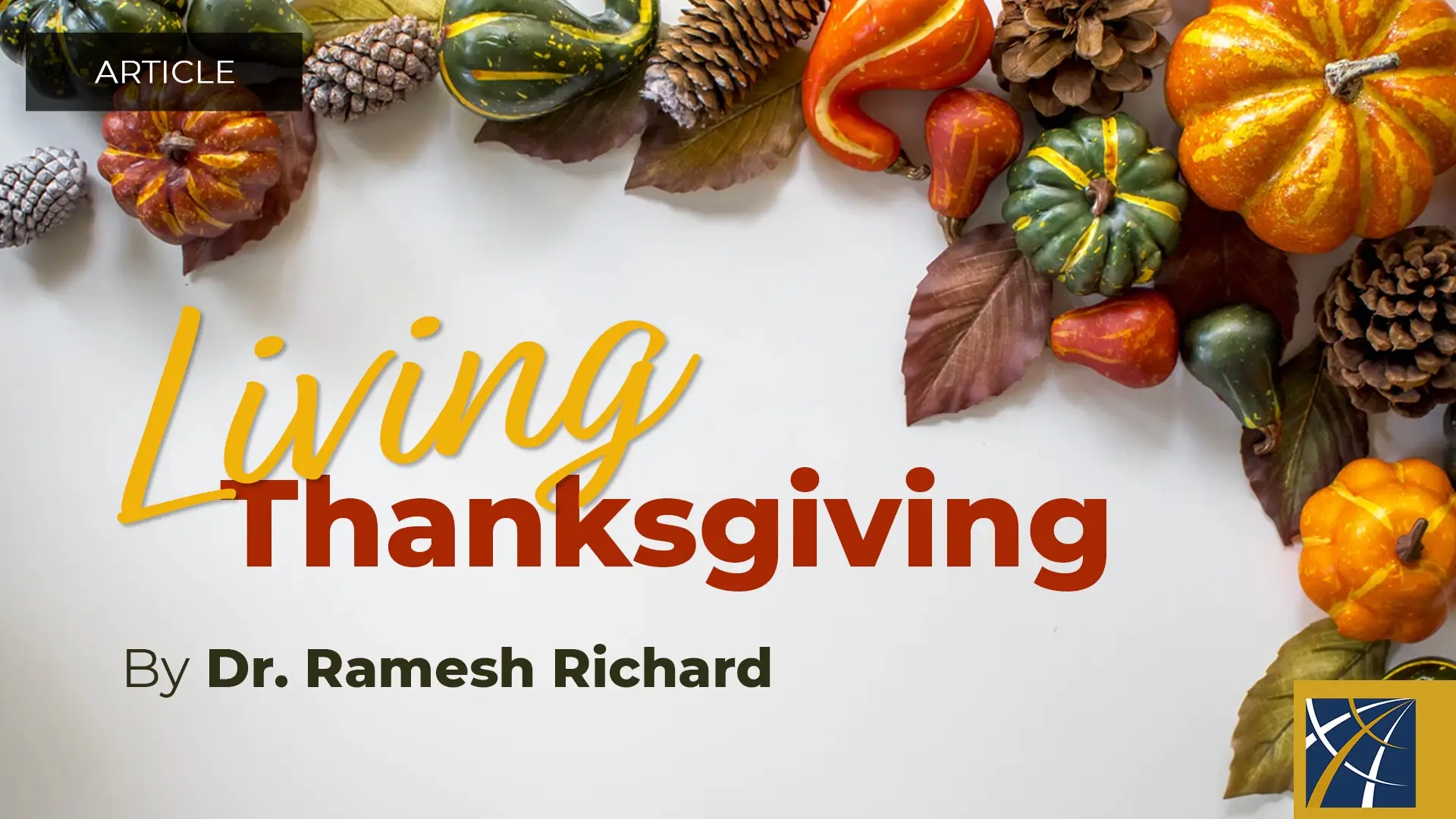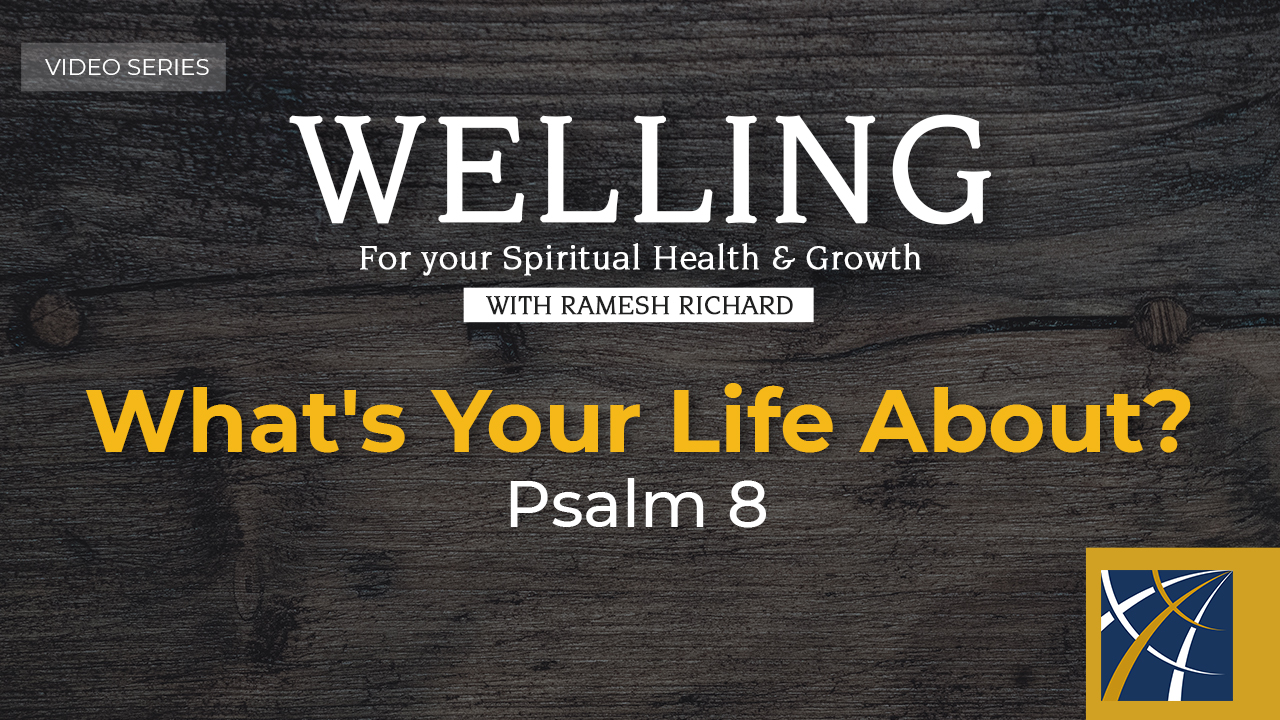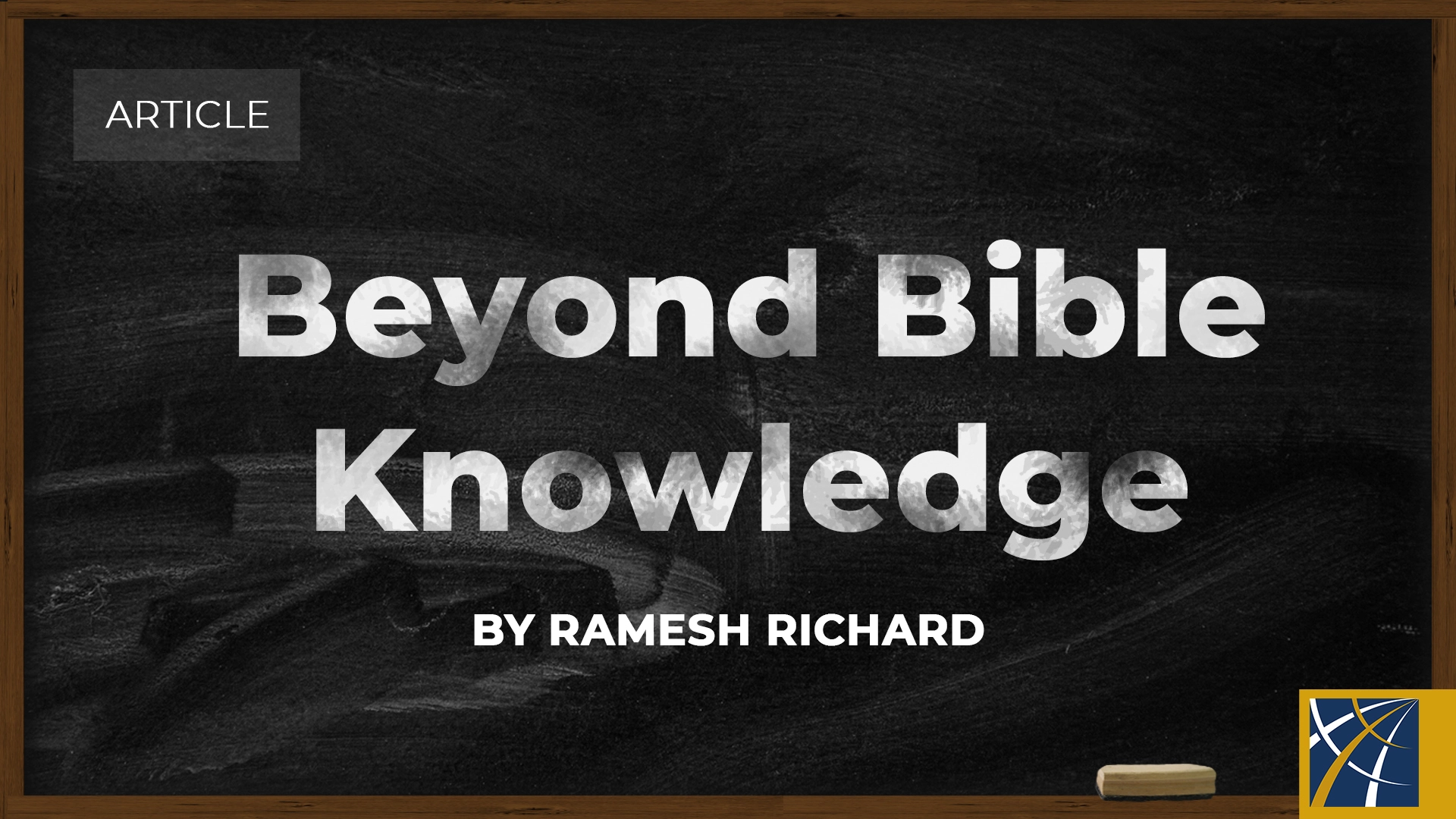By Ramesh Richard
“Hostile dependence”—a psychology phrase—describes a relationship in which a person must depend on someone else but doesn’t like it. There’s a tension. Maybe he or she does not like the person or simply the situation, but there is no option but dependence. Atheists feel the problem acutely. They dislike the idea of any dependence on a divine being. They reject the Giver of life. If these last two years have taught us anything, it’s that life and death are certainly not in our hands—whether we like that reality or not. We have had to fully depend on God (and His good gifts of family, friends, healthcare workers, etc.), sometimes even to just draw the next breath.
The only alternative to hostile dependence is grateful dependence. Grateful dependence is the essence of thanksgiving, which is especially appropriate in the case of a loving benefactor. Unfortunately, Christians sometimes try to find a middle ground between hostile dependence and grateful dependence, convinced that non-hostility toward God is the same as gratitude. Nothing could be more antithetical to the spirit of thanksgiving. We need to develop thanksgiving into an all-encompassing and active philosophy of living.
Detecting Unthankfulness
We know that hostility toward God is theologically incorrect. But what about occasional and random thanksgiving to Him? Did you know that a failure to give thanks in the worship of God actually leads to inadequate concepts about Him? Romans 1:21 tells us: “Yes, they knew God, but they wouldn’t worship him as God or even give him thanks. And they began to think up foolish ideas of what God was like. As a result, their minds became dark and confused” (NLT). An unthankful spirit reflects darkened, confused, idolatrous foolishness of unbelievers.
You can do the following exercise to help detect any unthankfulness in your heart. For space reasons, I can’t explain the terms, but you may resonate with their connection to a spirit of ingratitude. The following “spirits” and thanksgiving can’t coexist. Do you fall into a spirit of
- discontentment and dissatisfaction?
- criticism, non-cooperation, and being disagreeable?
- self-sufficiency and pride?
- rebellion, especially seen in passive aggression?
- complaining, grumbling, and murmuring?
- jealousy and envy?
- competition, conquest, and territorialism?
- greed, acquisition, and avarice?
- worry and fear?
- entitlement—that the good you got (or should have) is what you deserve?
Just when you have begun to recognize your fall into thankless idolatry, here are a few weightier issues to ponder
- Am I too thoughtless or busy to identify my blessings?
- Do I presume the future must turn out as good as or better than my past?
- Do I think less of spiritual blessings than I do of material blessings?
- Am I more taken up with the gifts than I am the Giver?
- Do I feel defeated in difficult circumstances?
- Do my prayers consistently include more requests than thanksgiving?
- Am I disappointed by God’s apparently “lesser” but equally gracious provisions?
- Are my views of success and significance distorted by comparing possessions or professions?
How do you feel after considering that list? Frankly, I know that idolatry and atheism are equally sinful. As in most attitudinal sins, omission and commission are sides of the same coin. To not give thanks is to be ungrateful. Hopefully, your spirit is thankful enough to continue reading this call to reflection, confession and correction.
So, how shall we keep from falling into occasional and random thanksgivings? Is it really through a dedicated calendar day in North America? We ought to define thanksgiving and explore its ongoing expression in life.
Defining Thanksgiving
The general definition of thanksgiving could read “a conscious, joyful emotion toward unearned blessing.” Christian thanksgiving will extend that general definition into “an awareness and expression of personal dependence on the ultimate Giver of all good things.” Thanksgiving will be intentional, not a default stance in Christian living. A grateful person is aware of joyful emotion in receiving unearned favor. The more unearned your gift is, the more thankful you are!
Living Thanksgiving
Giving is an active word, whether you are giving gifts or giving thanks. Bonnie and I once took a Spanish class for beginners. The teacher was explaining how to greet people on special days (e.g., Feliz Navidad on Christmas Day) when one student asked about “Happy Thanksgiving.” The teacher remarked, “Thanksgiving is a North American holiday,” so we don’t have a stock phrase. If you really want to wish somebody on Thanksgiving Day in Spanish, use Feliz Día de Acción de Gracias! Roughly translated, it reads, “Happiness on the day of the action of thanking!” The class became dismayed at the complexity of the language but seized the simplicity of the action concept.
Indeed, that’s a long way to greet somebody, but my Spanish teacher’s comments emphasized two meanings: While thanksgiving is a universally expected emotion, it’s not reduced to a specific day, or Spanish-speakers would have thought up an easier phrase for gringos to memorize! When your international neighbor remarks, “For us thanksgiving is not a day [any more than Mother’s and Father’s Day are single days], it’s a way of life,” you may want to consider the prod. More importantly, we intuitively know that thanksgiving is an action, not just a day dedicated to family, food and football. It spills over into a way of life.
So, here’s how a lifestyle of thanksgiving operates:
Thanksfeeling: “A happy emotion, a gladness to have what is given,” says one dictionary in describing thanksgiving. You must experience a glad feeling of thanks to a Giver. A critical or complaining spirit will hardly accompany feelings of gratitude.
Remember the “thankful” Pharisee who used the right verbal formula for having done the right thing? His feelings of self-righteous self-congratulation were not those of thanks at all (Luke 18:11). There was pride rather than gladness in his heart for his abilities.
Hostile dependence comprises feelings that must be weakened by feelings of grateful dependence. Thanksfeeling means you like your gift(s) and like the person who gave them to you. If you like the gift and not the giver then you can’t be grateful. Further, if the giver was required to give the gift out of debt or duty to you, then true feelings of gratitude will not emerge. You would be relieved that a debt was repaid, but not glad in the sense of appreciation for unmerited favors.
Thankssaying: A mother encourages her son in the first frame of a Family Circus cartoon strip, “Instead of always asking for things in your prayers, remember to say an occasional Thank You prayer.” “What should I say thank you for?” asks the son. Second frame: “For your family, for our good health, for this house, the fun we have, for your school, all your friends…” Third frame: The kid walks back to his room, gets on his knees and prays, “Thanks, God, for everything mom said.” He left out the details.
Feelings of thanks are better expressed by saying and doing thanks. The book of Psalms features genres of Praise or Thanksgiving psalms. “It is good to give thanks to the LORD,” opens Psalm 92, an individual psalm of thanksgiving in a public setting. The psalmist clarifies the virtue of public thanksgiving—really thankssaying. We say thanks to God in public because God is good, but also because thanksgiving in itself is good. A fine writer on leadership refers to the first responsibility of the leader—to define reality for the organization; and the final responsibility of the leader is…to say thanks!
Thanksdoing: Gratitude identifies the donor as giver and generates the appropriate attitude, but also motivates actions that will please the giver. There is grateful conduct toward the donor. Then, there is the grateful use of the gift.
Conduct motivated by thanks is far easier to execute than those motivated by future rewards. God uses both kinds of motivations in our obedience. Since we are clearer about blessings already received, we can be better motivated by God’s grace than by future rewards yet to be obtained by our good works. Church historians note that both gratitude and grace are blatantly absent in early Christian writings. Once the doctrine of grace is recovered (e.g., in St. Augustine), there is also a recovery of the significance of gratitude. Paul charges us, on the ground of God’s incredible, unmerited and extraordinary mercies (Rom. 1-11), to offer ourselves as living sacrifices in worshipful conduct (Rom. 12:1), a grateful offering for God’s graces.
May I suggest some immediate action items for you to pursue in thanksgiving? All of this is grace-based conduct, for grace and gratitude are first cousins in Christian thanksgiving, derived from the same Greek word (charis).
First, understand Christian thanksgiving well, as an entire way of life. For a start, look up antonyms of any term in the Detecting Unthankfulness list above and consider those meanings. One a week may be more convicting than you desire. You’ll grasp critical factors in thanksgiving. For instance, the opposite of discontentment is contentment. Contentment is a thanksfeeling. The opposite of stinginess is generosity. Or as my mentor Fred Smith, Sr., observed, “Giving is the drain plug for greed.” Generous giving is a thanksdoing. Evaluate your prayers for requests and praises. Which list is longer? Consider adequate thankssaying by making your requests known to God with thanksgiving (cf. Phil. 4:6).
Second, poke holes in your spirit of ingratitude. Take that “Detecting Unthankfulness” list again and argue with your wrong feelings, sayings and doings. For example, if you look with eyes and heart, you can compare your life with the less fortunate. Then your life will swell with gratitude.
Let me share a model in deflating ingratitude. You may be filled with an attitude of entitlement, that you are entitled to all the good you got, got all the good you deserve, and do not yet have all the good you rightfully expect. A Mercedes Benz dealer in Western New York handed me his business card that read, “Reward Yourself.” Meaning? “You have worked hard and long. You have become successful. You are entitled to a fine car … which, by the way, I sell.”
Now, look at that spirit biblically. The Apostle Paul asks, “what have you received that hasn’t been given to you?” (1 Cor. 4:7). Oops! Nothing that I have has been earned or deserved … that’s humbling and grates against our ingratitude.
Look at it theologically. If I got what I deserved, how come I am still alive? The only thing I deserve is to be eternally hurled into hell. I learn much from the pastors of war-torn, disease-ridden, famine-stricken Africa who thank God at our conferences for keeping them alive! As I continue to preach during long, hot hours, they also thank God for keeping them awake and alert. Think about these godly saints who have not gotten what they deserve if we quantify “just desert” by material benefits.
You could also look at your entitlement argument experientially. I am humbled by people all over the world who work as hard as I do, in more difficult circumstances than I am, and will never possess as much as I have. I can now be perpetually thankful since I really should have less than these struggling brothers and sisters of my larger family. If I am to acquire more, different, and better stuff, I had better use other arguments than basing my decision on a feeling of entitlement.
Third, catalog your blessings. A sure cure for ungratefulness, erroneous thinking, and even discouragement lies in counting your blessings. Each day for one month, I invite you to write out two or three blessings in your life. You will be overwhelmed. You will drop to your knees in thanksgiving. Some of the saddest words spoken by our Lord go this way, “Didn’t I heal ten men? Where are the other nine? Does only one (this foreigner) return to give thanks to God?” (Luke 17:17-18).
Here are some biblical categories under which you can list your blessings:
1) Spiritual blessing (Col. 1:12—for divine inheritance; 2 Cor. 9:15—for the Son; Eph. 5:20—for every spiritual blessing [cf. Eph. 1-3]; and 2 Cor.2:14—for continuous spiritual triumph).
2) Physical provision (Deut. 8:10; Psalm 103:1-3; John 6:11)—be simple and specific. In fact you can assess your closeness to God and your humility before Him by the specificity of your prayers of thanksgiving.
3) Relational (re)solution (Col. 3:15): Never take the joy of relationship and the blessing of forgiveness between family, friends, church, and colleagues, for granted.
4) Daily sustenance (Psa. 68:19)— fully and until the end. I actually list “daily simple pleasures” in my PDA—-from listening to classical music to reading the New York Times to writing with fountain pens to singing aloud (privately, of course, but check the “singing” context of Eph. 5:20 and Neh. 12:31)—that prompt spontaneous thanks.
5) Service opportunities and fruit (1 Cor. 1:14-15; 1 Tim. 1:12; Acts 28:15; 1 Thess. 3:9).
6) Any circumstance (1 Thess. 5:18): If you have been looking for God’s will for your life, Paul’s imperative on thanksgiving is circumstantially comprehensive and continuous: “Give thanks in every circumstance, for this is God’s will for you who belong to the Lord Jesus” (1 Thess. 5:18). Thanksgiving goes beyond the circumstantial and temporary to the spiritual and internal. Consequently, no matter what happens you can thank God for eternal and internal blessings (Eph. 5:20) and in any temporary circumstance (1 Thess. 5:18).
Year-round, life-long thanksgiving, then, can be called thanksliving. “Let your lives overflow with thanksgiving for all he has done” (Col. 2:7). Thanksliving comprises thanksfeeling, thankssaying and thanksdoing.
We have a choice between hostile or grateful dependence on God, our Creator, Redeemer, and Sustainer. After Thanksgiving is not Christmas. That’s a calendar view of existence that possibly descends to a greed for gifts. After Thanksgiving comes … Thanksgiving, that precedes … Thanksgiving—a Christian view of life—that continually ascends to the giving of gratitude to God, the Creator and Giver of all good gifts (1 Tim. 4:4; 6:17). Let’s thank God for all we have and trust Him for all we need. Will you join me in launching a new way of thanksgiving—thanksliving?
Check out the companion Bible Reading plan to this article by clicking here.






